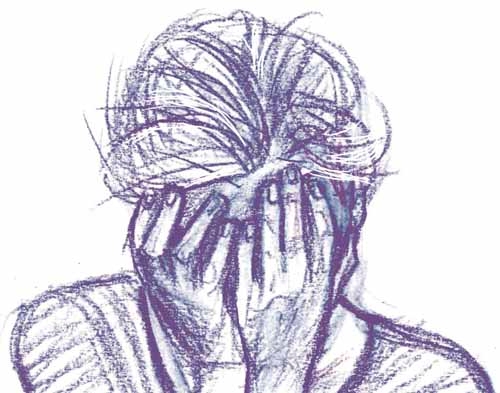Struggling with ups and downs: Depressive disorders


It’s time for the meeting, and the regulars at the bipolar/depression support group have just settled in behind the tables that form a circle.
It’s a fairly balanced mix of men and women, most in their 30s and 40s. Everyone is wearing dark colors – black or navy blue – and the energy in the room is noticeably low.
Aside from that, the group looks relatively normal. Nobody is tearing his hair out, or sobbing uncontrollably, or even looking particularly sad.
Major depressive disorder, categorized as a severely depressed mood and activity level that persists two weeks or more and interferes with daily functioning, is one of the most common mental health disorders in the country, according to the National Institute of Mental Health.
Signs and symptoms vary with the individual.
The probable causes – brain chemistry, trauma, genes – are still being debated by scientists and mental health professionals.
Facilitators at the support group meeting start the discussion about making the most of life.
One woman says her last depression lasted almost a year. She couldn’t sleep without medication, and she lost interest in all the things she once loved to do.
"I really didn’t value anything. It’s important to remember the kinds of things you like," she adds, "because you forget, and you don’t like things anymore."
Another member says he plans for his next depression.
"I make accommodations for when I’m ill while I’m enthused and while I’m well and while I’m able to function clearly," he says proudly.
One of his accommodations is a set of optimistic aphorisms on index cards he can pull out to lift his mood. The cards, he says, "speak of things as concrete, as though they already are."
The topic shifts to the tendency to downplay symptoms to avoid the stigma of having a mental health disorder.
"Most people don’t understand mental disorders, so I don’t confide in those people," a woman says. "I’ve heard people say suicide is ‘the most selfish thing a person can do.’ Anyone who has even contemplated suicide knows that if you feel that way you also believe everyone will be better off if you’re not around."
"You don’t want people to know how bad it is," another support group member points out, "because you don’t want to be hospitalized again."
Another woman nods in recognition.
"I lie," she admits. "I lie right up until the paramedics are taking me to the hospital."
LEVELS OF DEPRESSION
The latest statistics from the National Institute of Mental Health show about 20.9 million American adults, or 9.5 percent of the population ages 18 and older, have mood disorders – major depressive disorder; dysthymic disorder (a chronic, mild depression); and bipolar disorder (also called manic depression). Bipolar disorder is characterized by "cycling mood changes – from extreme highs (e.g., mania) to extreme lows (e.g., depression)."
The average age of onset of a depressive episode is 32, and women are 70 percent more likely to experience one than men, according to the institute.
"For girls and women there are hormonal factors that play a part," explains Kathleen M. O’Leary, acting chief of the women’s program at the institute. " A lot of research has been done to try to determine the role that the endocrine system and the gonadal steroids play in depression."
Postpartum depression – depression in women that coincides with giving birth – can lead to postpartum psychosis, O’Leary notes, "which can be a dangerous mental illness, and women can be at risk of hurting themselves or their infants."
Early symptoms of depression may go unnoticed, according to Dr. Robert M. Peprah, a local psychiatrist.
"You might not even recognize it," Peprah says. "It might take someone close to you to notice it. People saying you’re not yourself."
Brief periods of depression are common and don’t necessarily require treatment, Peprah notes.
"A fairly significant number of us will go through some kind of depression in our lifetime," he says.
Depression, at its roots, is basically the "inability to manage stress," he adds.
What keeps these minor depressive episodes from turning into a major depressive disorder?
Peprah says the most important factor is support from family and friends.
O’Leary agrees: "People who have some of these symptoms need to really make an effort to talk to their friends and family."
SUICIDE ATTEMPTS
The most dangerous symptom of untreated depression is thinking about suicide, known as "suicidal ideation," which can lead to an actual suicide attempt.
"I was taken by ambulance to a hospital after I took a bottle of sleeping pills," says Cindy, a well-dressed professional in her mid-40s who was diagnosed with major depressive disorder three years ago.
"They kept me in the hospital for a while – I think it was 24 hours – and then they transferred me to a psych hospital. I spent a few days there."
Cindy, who asked that her real name not be used, says her depression came on after a six-month stint of caring for her dying mother.
" My father passed away in May 2009, and my mother was diagnosed with cancer in July. I spent six months as her caretaker. I moved into her house, slept in the next room, prepared her meals, took her to her chemotherapy appointments. I really built up Christmas, because I knew it was going to be her last. I invited all the other family members to a big Christmas dinner. I managed to make it through Christmas, and then I just fell apart.
"I didn’t have any energy or motivation to do anything. It just got worse. I couldn’t get out of bed. I couldn’t even take care of my mother anymore. I took the pills one Sunday afternoon when she had visitors. My husband came in the bedroom to ask me for help transferring my mother from her wheelchair into bed. I had taken the pills about a half-hour earlier, and was getting kind of groggy. That’s when he called the paramedics."
What causes depression is still being researched. One theory is that depression is caused by a chemical disorder in the brain. While this is the theory behind the use of antidepressant medication, it has been difficult to prove, according to the National Institute of Mental Health.
Cindy says she has thought a lot about the cause and effect since she was diagnosed.
"I realize that my mother was probably depressed most of her life, but it was never diagnosed, and she probably didn’t even know it. Then I recognized my own depressive bouts over the years, nothing as severe as the one that landed me in the hospital, but there have been times when I couldn’t get out of bed for days and had no motivation to do anything."
STRESS OF THE HOLIDAYS
The holiday season may be known as a trigger for depression, but Beth Israel Deaconess Medical Center, a teaching hospital of Harvard Medical School, reports that "various studies have shown no relationship between depression and suicide, and the holiday season."
Seasonal affective disorder is, however, a form of depression that is related to the winter season; but it is triggered by the short dark days of winter, not the actual holidays, according to the medical center’s website.
"The holiday season is a time in which many people reflect on their relationships with their families. Unfortunately, this can be distressing for those who have strained or estranged family relationships," says Dr. J. Juan Garcia, owner of Vantage Counseling in Las Vegas.
"In addition, those who have experienced a death of a loved one are more likely to long for them throughout the holiday season because this was likely a time that was usually spent with them. Moreover, people may exercise less due to the colder climate. This can increase the risk for depression because regular exercise is a powerful protective factor against it."
Garcia says if someone is grieving past holidays, finding new ways to celebrate is a good way to avoid depression.
"If circumstances are such that you are unable to celebrate the holidays in a traditional way, be sure to create new traditions with friends, family members or independently. Volunteering or traveling over the holidays can be extremely therapeutic."
Anyone whose depressed mood lasts for two weeks or longer should make an appointment with their medical doctor, therapist or church counselor, according to O’Leary of the National Institute of Mental Health.
But if someone thinks she might be experiencing postpartum psychosis or can’t even get out of bed in the morning and is in danger of losing her job she should go straight to a psychiatrist, O’Leary adds.
THERAPY AND OTHER TREATMENTS
The most common treatments for depression are antidepressant medication and psychotherapy.
Garcia believes depression should be treated initially with therapy.
"Medication is rarely an immediate option," he says. "Psychotherapy can alleviate depression for most outpatient clients. However, if the depression has been chronic, or if there is a genetic predisposition to it, I may refer a patient for a medication consultation subsequent to psychotherapy. I also may refer a patient for medication if the depression is severe or if the need for relief is urgent."
If someone is diagnosed with major depressive disorder, will they get over it? If so, is the likelihood greater for another episode?
"I worry all the time about a depression sneaking up on me, because I know what it’s like," Cindy says. "The depression takes over, and there’s nothing you can do about it. It’s almost like being afraid of yourself. My therapist tells me I’m doing everything I can to stave that off."
Anyone who has been diagnosed once needs to stay on top of it, Garcia says.
"It is very possible to recover from depression without future relapse. But mental health, like daily hygiene, is an ongoing responsibility, and neglecting this could put one at risk for relapse."
" These are episodes; they are not a chronic life illness," O’Leary says. "Most depressions go away on their own. Therapy has been shown over and over again to be effective in treating depression, and medication for someone who really has a serious depression."
ASKING QUESTIONS
Most people are uncomfortable dealing with suspicions of a suicide attempt, or even actual threats of suicide, because they are unsure of how serious the situation is and reluctant to invade someone else’s privacy.
"It’s scary to hear that, so people naturally want to reassure themselves and the person that they don’t feel that way," O’Leary says. "I think people need to sit on that impulse, if they can, and ask some questions, like, ‘How long have you been feeling this way?’ ‘How severe is it?’ ‘How can I help?’ ‘Would you like to talk to a professional?’ "
Institute guidelines urge anyone who suspects someone may be intending to harm himself or herself to seek help immediately: "Do not leave your friend or relative alone. Call 911 or go to a hospital emergency room to get immediate help, or ask a friend or family member to help you do these things."
The toll-free, 24-hour hotline of the National Suicide Prevention Lifeline is 1-800-273-TALK (1-800-273-8255); TTY: 1-800-799-4TTY (4889) to talk to a trained counselor.
COMMON SYMPTOMS OF DEPRESSION• Persistent, sad, anxious or "empty" feelings
• Feelings of hopelessness or pessimism
• Feelings of guilt, worthlessness or helplessness
• Irritability and restlessness
• Loss of interest in activities or hobbies once pleasurable, including sex
• Decreased energy and fatigue
• Difficulty concentrating, remembering details and making decisions
• Insomnia, early morning wakefulness or excessive sleeping
• Overeating or appetite loss
• Aches or pains, headaches, cramps or digestive problems that don’t improve even when treated with standard remedies
SOURCE: National Institute of Mental Health


















